Surah Mumin is the 40th Surah of the Noble Quran. It is the first of seven Surahs that begin with the letters Haa Meem. Collectively they are known as Aala Haa Meem or Hawaameem.
- Ibn Masud radhiallahu anhu says that these Aala Haa Meem Surahs are the decoration of the Noble Quran.
- Ibn Abbas radhiallahu anhuma says that everything has an essence, and the essence of the Noble Quran is Aala Haa Meem.
- Ibn Masud radhiallahu anhu compares the reciter of the Noble Quran to a traveller setting out to find a place for his family to settle. He comes to a place that has signs of good rainfall. While he is walking around and admiring it, he suddenly comes across beautiful gardens. He was impressed with the first place he found, but the what he sees after that is even better. Ibn Masud radhiallahu anhu likens the first place to the Noble Quran and the beautiful gardens to the splendour that is Aala Haa Meem.
- Ibn Masud radhiallahu anhu says that he enjoys then recitation of the Noble Quran, and when he reaches Aala Haa Meem it is like reaching a beautiful garden and he takes his time reciting to gain the full joy.
Passion for the Noble Quran
This is the first lesson; that we need to love the Noble Quran like the Sahaba radhiallahu anhum did. The example is like that of a soccer fanatic. He didn’t become a connoisseur or lover of the game overnight. Perhaps he was first introduced to the sport with a ball that his father kicked to him in his yard. Then he played matches with his friends, becoming more proficient and informed of the nuances of the game, the moves, and the good players. It then grew into a passion, such that for many it is a drug, replacing the emotion of worship.
We need to keep on improving our connection with the Noble Quran by reading, perfecting, becoming more fluent in recitation, understanding the meaning and practice on its message. Attending Qirat programs, Tafseer lessons, Tajweed and Hifz classes are some of the ways to enjoy the Noble Quran like the Sahaba radhiallahu anhum did.
Ways of Protection
One of the ways to gain protection in these times of insecurity is to recite Ayatul Kursi (Noble Quran 2:255) and the first three verses of Surah Mumin early in the day. This is protect you from everything bad and painful during the course of the day. (Tirmidhi)
We are instructed to recite Haa Meem Laa Yunsaroon when we happen to come under any attack such as hijackings or robberies. (Tirmidhi)
The first verses of Surah Mumin are vividly evocative:
Verse 1: “The revelation of this Book is from Allah; the Almighty, All-Knowing,”
Verse 2: “the Forgiver of sin and Accepter of repentance, Severe in punishment, and Infinite in bounty. There is no god worthy of worship except Him. To Him alone is the final return.”
- The Forgiver of Sin. Allah Ta’ala is the One who puts a cover over our sins. They are no more seen or even known by others. We might be pious now, but have a past of sins which people do not even know about. Allah Ta’ala has the authority and power to forgive us without us even repenting. This might be due to some good deeds we do, or simply through His Mercy.
- The Accepter of Repentance. When we falter and commit a sin, then beg Allah Ta’ala for forgiveness, we are guaranteed acceptance.
- Severe in Punishment. While we rely on Allah Ta’ala’s forgiveness and mercy, we also remember that He is severe in punishing. These two attributes of forgiveness and punishment, and the resultant feelings of hope and fear go together. At times we are in a state of hope, at times fearful so that we do not become complacent, nor overwhelmed with despair.
- Infinite in Bounty. Allah Ta’ala is the One who grants us blessings, is ever generous and the source of all the favours we enjoy in life. While we journey in this life, we strive, make connections, do our best and reap the rewards, but we never lose sight of the fact that the source of all our success and happiness is Allah Ta’ala. As such, we should never fall short in pleasing Him.
“Indeed, sincere devotion is due only to Allah.” (Noble Quran, 39:3) Allah Ta’ala alone deserves our exclusive submission, adoration and worship.
The effect of these verses
These verses have a powerful impact in reforming people. By reflecting on them, we come to the realisation that I need to make a change for the better in my life. I need to reform and please my most kind Allah Ta’ala.
A Syrian man used to attend the gatherings of Hazrat Umar radhiallahu anhu. He didn’t show up for a period of time. Umar radhiallahu anhu enquired from the people is they knew the reason. They replied that he should not even ask, as the man had become a drunkard. Umar radhiallahu anhu dictated a letter to him, quoting these opening verses of Surah Mumin. Then he turned to those around him and said, “Let us pray to Allah Ta’ala to reverse his heart and accept his repentance.” He instructed the messenger to hand the letter to the man only, and only when he was sober. The man read the letter repeatedly and started to weep. He stopped drinking alcohol and made such a repentance that he never touched liquour again.
When Umar radhiallahu anhu heard this, he remarked, “You must do the same. When your brother falls into sin, or slips up, then think of wise methods to bring him back to his normal and better self. Encourage him to turn to Allah Ta’ala, to trust in Him and to rely on His Mercy. Pray to Allah Ta’ala for him, that he is given the opportunity to repent. Do not help Satan against him by infuriating him. This might only serve to turn him further away.”
This is how we help others become better people:
- Make Dua for them.
- Use gentle and wise ways to bring them towards reform.
- Do not be aggressive for it might not help the person. It could rather amount to helping Satan as it would push him further away from goodness.
Disputing regarding the Noble Quran
Verse 4: “None disputes the signs of Allah except the disbelievers, so do not be deceived by their prosperity throughout the land.”
The Hadith tells us that disputing regarding the Noble Quran is disbelief. (Abu Dawood) Communities were ruined because they started quarrelling regarding the Book of Allah Ta’ala. (Muslim)
This includes taunts, passing sarcastic comments, engineering disputes or interpreting the verse of the Noble Quran in a way that is not in line with the Sunnah. We need to accept the rulings of the Noble Quran without bringing our own ideas into the picture.
Honest enquiry about something that we sincerely wish to learn about does not fall under this prohibition.
“Do not be deceived by their prosperity throughout the land.” The prosperous movements of the disbelievers between the cities should not deceive us. The disbelieving Quraish would travel to Yemen and Syria in their trade caravans. They were held in high esteem across Arabia. They remarked, “Had we been in the wrong, these blessings would have been taken away!” Muslims might also start doubting when they see the West far ahead in technological advancement and sophistication. They might become doubtful of the system of Islam. Here we are shown that their prosperity despite their disbelief is but a temporary respite given in the Wisdom of Allah Ta’ala.
When the Prophets brought the message of Islam, the disbelievers exulted with the knowledge they had and rejected the message of the Prophets (Noble Quran, 40:83). Our knowledge of trade and commerce and industry and the sciences should never lead us to look down on the knowledge of Islam. “They know something superficial of the worldly life, but of the Hereafter they are oblivious.” (Noble Quran, 30:7)
Angelic Duas
Verse 7: “Those angels who carry the Throne and those around it glorify the praises of their Lord, have faith in Him, and seek forgiveness for the believers, praying: “Our Lord! You encompass everything in Your mercy and knowledge. So forgive those who repent and follow Your Way, and protect them from the torment of the Hellfire.”
The angels pray for those who have faith and more especially for those who repent for their wrongs. They pray for them to enter Paradise and their families, and that they be saved from Hell.
When a Muslim enters Paradise he will ask about those of his family members who he does not see, wanting to know where they are. He will be told that their deeds were not like his so they would not be with him. He will reply, “Whatever good I did was not for me alone. It was for me and them.” They will then also be admitted to Paradise and to his status. It is therefore crucial that we be close to the pious so that they may remember us in the Hereafter. We should also motivate our children to be pious and better than us so that they may intercede for us.
Dua is a vital part of our lives. We don’t know whose Duas are behind us. It could be those of the angels or our parents. We see success in life and it could be due to the sincere Duas of others for us. Constantly make Dua for ones kids and parents. The Duas that parents make for their children are readily accepted. Avoid negative words when speaking about kids for they might become a bad Dua for their lives.
In good times and bad, set aside a time daily to ask from Allah Ta’ala.
Verse 60: Your Lord has proclaimed, “Call upon Me, I will respond to you. Surely those who are too proud to worship Me will enter Hell, fully humbled.”
Those who display arrogance in not asking from Allah Ta’ala are on a slippery path. When a person leaves out Dua considering himself to have no need to make Dua, this arrogance can lead him to disbelief and Hell.
A special honour for the Muslims is that we are ordered to make Dua and the Dua will be accepted. This was previously a speciality of the Prophets of the past. Now it is a distinction given to the Muslim community.

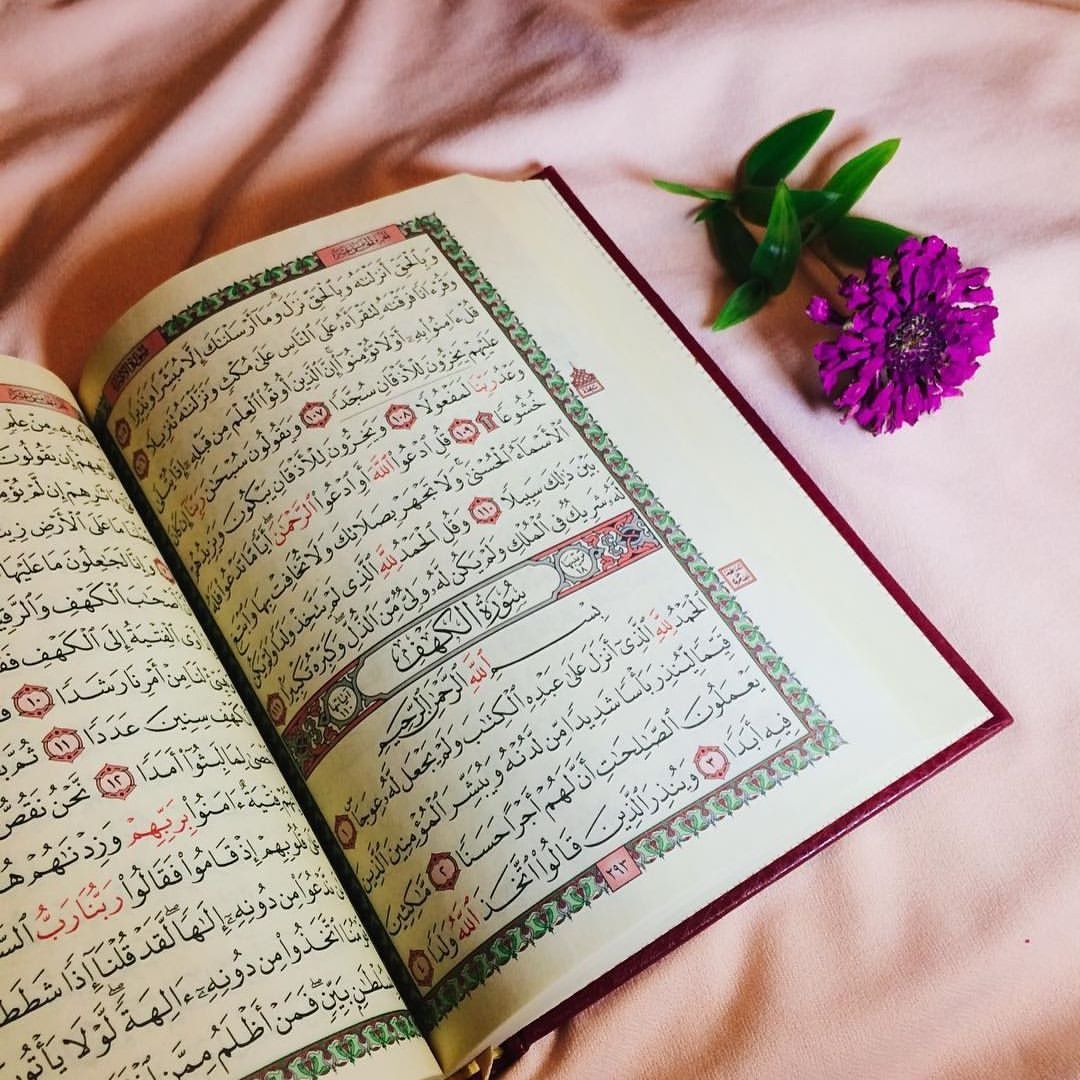
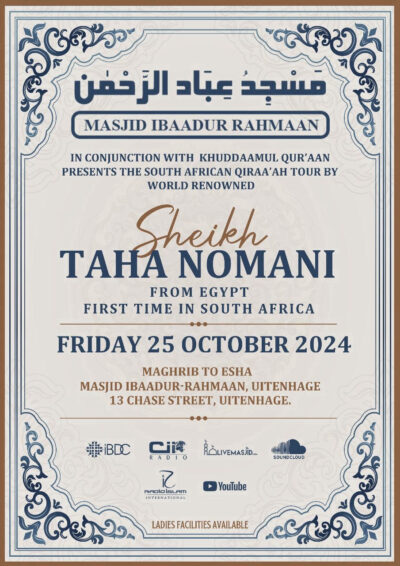

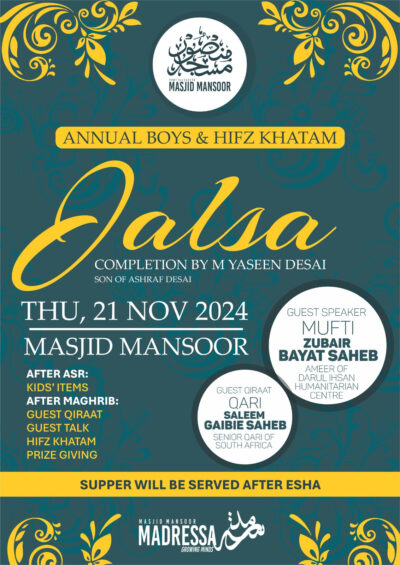

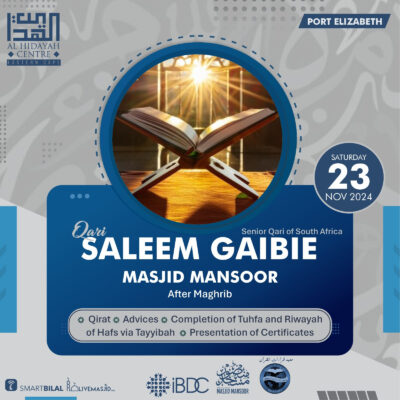
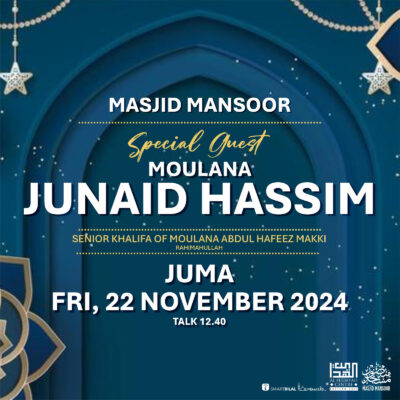
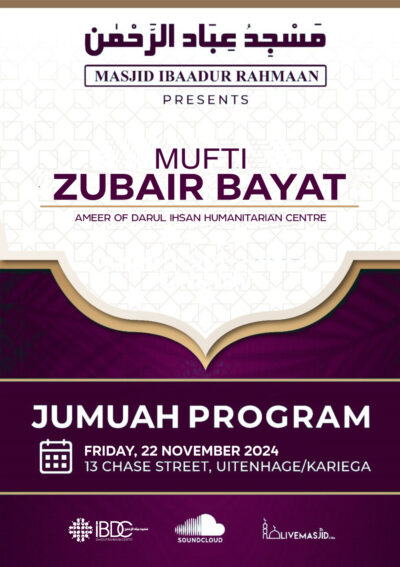
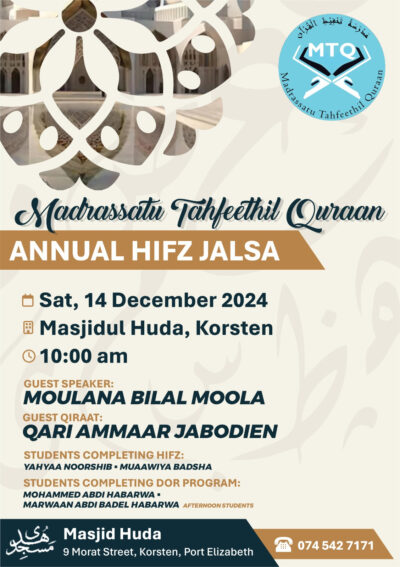



COMMENTS